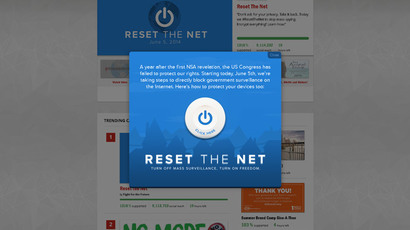US promises EU citizens more privacy rights over data protection

The US has vowed to extend data protection laws to EU citizens and give them more privacy rights. The EU has called the move “a step in the right direction” as the two sides are seeking to recover relations strained by Snowden’s NSA revelations.
"The Obama administration is committed to seeking legislation that would ensure that ... EU citizens would have the same right to seek judicial redress for intentional or willful disclosures of protected information and for refusal to grant access or to rectify any errors in that information, as would a US citizen," US Attorney General Eric Holder said as the EU and the US justice and home affair ministers met for discussions in Greece, which holds the rotating EU presidency.
The commitment, “which has long been sought by the EU,” shows the determination of the US “to move forward," Holder stressed.
The planned legislation, once enacted by Congress, will extend the guarantees made under the US Privacy Act - which now protects only Americans - to EU citizens, allowing them in addition to see and correct records about themselves and challenge any misuse of information.
Giving EU citizens outside America the right to go to the US courts and sue over improper use of their private data has been one of the stumbling blocks to sealing the long discussed personal data protection agreement between the two sides.
Welcoming the announcement as "an important step in the right direction towards rebuilding trust" in EU-US “transatlantic relations,” the EU Justice Commissioner Viviane Reding has called on the US to “swiftly” translate it into legislation “so that further steps can be taken in the negotiation.”
"Words only matter if put into law. We are waiting for the legislative step," Reding said in a statement.
The legislation would "fill the gap between the rights US citizens enjoy in the EU today, and the rights EU citizens do not have in the US," Reding stated.

This issue has caused friction in EU-US ties in recent years, but there are ongoing efforts to resolve the problems, EU Commissioner for Home Affairs Cecilia Malmstrom said at a news conference in Athens.
“EU-US relations have been strained lately in the aftermath of the Snowden revelations, but we have worked very hard to restore trust and there is strong commitment on both sides to work jointly and closely on our common challenges,” Malmstrom said.
The announcement by the US paves the way for a key data protection deal aimed at protecting personal information transferred for law enforcement purposes. European and American governments have been discussing the agreement since 2011 and the negotiations are at a "final stage," Brussels said.
The EU and the US are also in talks to find ways to strengthen the so-called "Safe harbor" agreement that allows US companies to gather customers’ personal data in Europe and transfer it to America.
Relations between the EU and US have been tense after the NSA’s Edward Snowden leaked evidence that American spies were listening to the phone calls of top European citizens, and leaders such as Germany's Chancellor Angela Merkel.
READ MORE: Year of the whistleblower: 10 things we didn’t know before Snowden
Snowden also revealed that the US authorities monitored personal money transfer information and bank and credit card transactions from a Brussels-based system called SWIFT, a financial-record sharing program designed to track terrorist activity.
The Snowden leaks showed the NSA had gained a “back door” entrance into the SWIFT servers, which revealed the banking details of millions of European citizens, despite the fact that access to this financial data was limited by the Terrorist Finance Tracking Program (TFTP).














